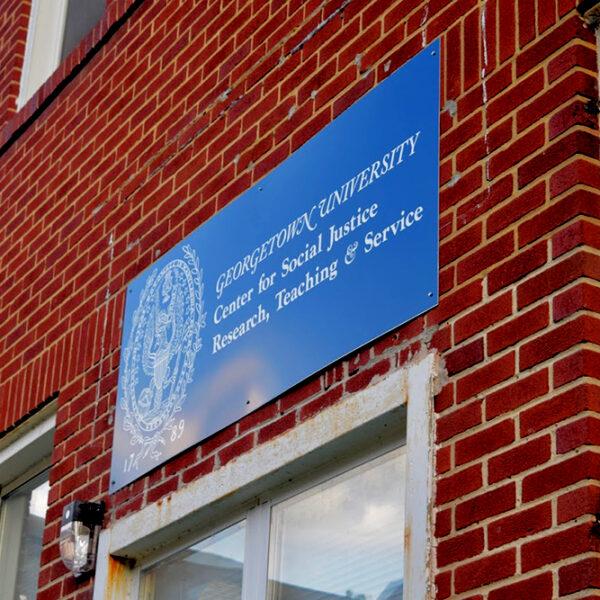Georgetown University’s Center for Social Justice Research, Teaching and Service (CSJ) and the Berkley Center for Religion, Peace and World Affairs named four Georgetown students this year as their 2023 Education and Social Justice (ESJ) Fellows.
Created in 2010, the fellowship aims to provide students with the opportunity to conduct research on the connections between poverty and education. The four fellows — Evan Bianchi (CAS ’25), Molly May (CAS ’24), Pragyan Acharya (GUQ ’24) and Renee Vongai Mutare (GUQ ’24) — will be studying the intersection of education and social justice over three weeks of fieldwork this summer in countries including Belize and the Philippines.
The ESJ is part of the Berkley Center and CSJ’s Education and Social Justice Project, which works to build knowledge about local, religiously affiliated efforts that encourage community development through education linked to Georgetown’s Jesuit values.
The Berkley Center and CSJ place each fellow in a different global host site with a Jesuit partner school in an under-resourced community, meaning fellows must adapt to their environments on the fly. Past scholars have conducted research in 39 countries, from Australia to Zambia.
May said she appreciates that this process allows her to learn about the field of research that will most help her host institution.
“I think that’s the beauty of the ESJ Fellowship,” May wrote to The Hoya. “Rather than coming into it with a topic we want to research or even a location we want to travel to, the project is really centered around the needs of the host community.”
Acharya said he intends to use the fellowship to gain the practical research skills necessary for a career in education policy in his home country of Nepal.
“I aspire to become fluent in qualitative research methodology for education research. I also hope to better understand the role Jesuit education institutions play in various parts of the world,” Acharya wrote to The Hoya. “The ESJ is a fellowship that has been available for over ten years now at Georgetown, and I hope I can engage with and contribute to the body of literature it has created.”

May said she hopes the fellowship will teach her how to improve support for marginalized identities within the U.S. educational system by learning from global best practices.
“Here in the United States, educational policies that have failed to specifically consider their future impact on marginalized communities have seriously harmed these communities. Today, schools are extremely segregated across the nation, and your quality of education is directly linked to your zip code and wealth,” May wrote. “I am really interested in what we can learn from other systems of education and how we can implement aspects into the American education system.”
In the U.S. school system, there are vast achievement gaps between white and higher-income students and Black, Hispanic and lower-income students, according to a 2020 study by the consulting firm McKinsey & Company. School shutdowns due to the COVID-19 pandemic exacerbated these gaps, with students of color falling further behind after remote learning.
The fellowship will also help uplift and raise awareness for the funding struggles partner communities face, according to Mutare.
“I also hope that this fellowship creates a platform for the communities we will be working in to have their efforts and challenges talked about on a bigger platform while also pushing for other individuals to enforce change in their communities,” Mutare wrote to The Hoya.
As a student doing advocacy work in her home country of Zimbabwe, Mutare said she has experienced the challenge of securing greater access to education firsthand and hopes to use this opportunity to give back to communities like her own.
“As Hoyas, we have the privilege of having all these resources at hand, and as someone who’s been on both sides…. I understand that whenever it is within our capacity, we should help propel others to get access to quality education,” Mutare wrote.
May said the fellowship will provide her with a better understanding of how to do research as an outsider, coming from a background of privilege.
“As someone who hopes to go into research in the future, I want to feel more comfortable approaching research projects and understanding how my positionality will affect the project,” May wrote. “I think a lot of research can do more harm than good to communities, and this is what I hope to avoid.”
May said a focus on social justice when performing education research is vital in ensuring that reforms create equitable outcomes for all students.
“The intersection of international education and social justice is so important to me because without a focus on social justice, educational initiatives can do a lot more harm than good,” May wrote. “Without social justice, education simply increases opportunity disparities.”





















